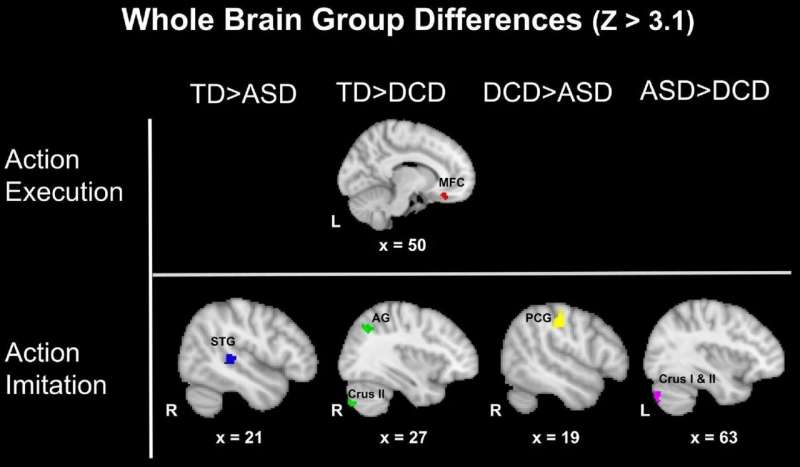This article has been reviewed according to Science X's editorial process and policies. Editors have highlighted the following attributes while ensuring the content's credibility:
fact-checked
peer-reviewed publication
trusted source
proofread
AI could help in the early diagnosis of autism, study finds

Artificial intelligence, coupled with data from an iPad coloring game, could assist in early diagnosis of autism, a new USC study shows.
"These results indicate the potential for an easy and novel method for early detection of autism and development coordination disorder," said senior author Lisa Aziz-Zadeh, a professor at the USC Mrs. T.H. Chan Division of Occupational Science and Occupational Therapy. "This is especially important as motor signatures appear early in autism—usually before social symptoms. And this methodology does not involve potential biasing by the assessor."
The results appear in the Journal of Autism and Developmental Disorders.
Previous studies have shown it is possible to use technology to categorize autism from typically developing individuals, but it can be difficult to distinguish autism from other similar developmental disorders. For example, developmental coordination disorder—primarily a motor skills disorder—has features that overlap with autism. Children with autism spectrum disorder often have both motor and sensory deficits in addition to the social deficits that are the hallmark of the disorder.
"Early identification allows for tailored therapeutic approaches, which result in better long-term developmental outcomes," said first author Christiana Dodd Butera, a postdoctoral fellow at USC Chan. "Having the appropriate therapy for the appropriate child at the most impactful time in development would be the long-term goal of this detection work."
AI and autism: Using machine learning analytics
For the study, 54 children between the ages of 8 and 17 took part in a five-minute coloring game on iPads. Eighteen had autism, 16 had developmental coordination disorder, and 20 were developing typically. The iPads collected touchscreen kinematic data—for example, how hard kids are pressing and the jerkiness or velocity of movements. The researchers used machine learning analytics, a form of artificial intelligence, to process the information.
"We were able to correctly distinguish between a typically developing child and one with autism spectrum disorder with 76% accuracy," said Aziz-Zadeh.
Researchers also were able to correctly distinguish between typical development and developmental coordination disorder with 78% accuracy, and autism and developmental coordination disorder with 71% accuracy.
The study was conducted in high-functioning children and adolescents with autism and needs to be replicated in larger, younger, and more diverse groups, researchers said.
"We would want to see this signature as early as possible," said Butera.
The study is just one example of how researchers are using artificial intelligence to detect, teach, and assist children with autism. Social robots, which are made to interact with humans, can help teach social and educational skills to students of all abilities. A tabletop robot developed by researchers at Yale University models appropriate "social gaze" behavior and improves communication.
More information: Christiana Butera et al, Motor Signature Differences Between Autism Spectrum Disorder and Developmental Coordination Disorder, and Their Neural Mechanisms, Journal of Autism and Developmental Disorders (2023). DOI: 10.1007/s10803-023-06171-8




















